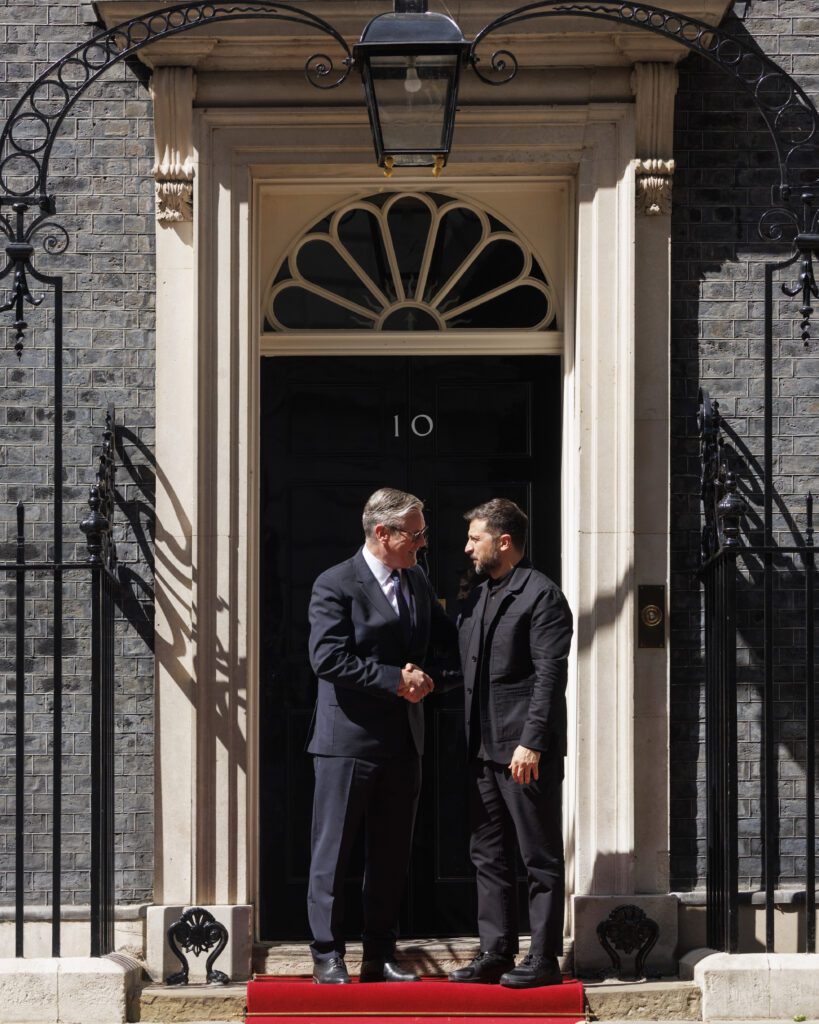Today, Keir Starmer will join Zelensky and Trump at the White House alongside other European leaders and reaffirm his role as the transatlantic hinge in US-Russia relations which has persisted since the invasion in February 2022.
As of August 2025, the UK remains as the bridge and ballast between Washington and Europe on Russia: Shoring up Ukraine, leading on sanctions enforcement, and trying to steer a volatile Trump–Putin track toward outcomes Kyiv can live with – with Starmer simultaneously tasked with reconciling Washington’s unpredictability.
On the surface, you’d be forgiven for not noticing the tension rife in this seemingly innocent role; when Inspector Starmer arrives on the scene, it’s not entirely clear where the contradiction even lies – but it’s there.
For years, Britain has supplied Ukraine and trained its army at scale, led Europe on sanctions and oil-cap enforcement, and corralled allies into coherent asks of Washington.
Yet now, it does so while Keir Starmer leverages a surprisingly warm relationship with Donald Trump to push for U.S. security guarantees for Kyiv and to resist any Anchorage-style shortcut that would legitimise Russian land-grabs.
On the one hand, Britain is presenting itself as the principled, rules-based anchor: Arming Ukraine, enforcing sanctions, keeping Europe united, and warning against any settlement that rewards Russian aggression.
On the other hand, it is simultaneously leaning on a personal relationship with Donald Trump — a figure who thrives on disruption, transactional deals, and shortcuts.
Starmer is effectively relying on Trump’s goodwill to prevent the very kind of bilateral bargain (a U.S.–Russia carve-up) that Britain opposes.
Britain acting as a mediator between Washington and Moscow is not new: Thatcher and Reagan coordinated closely during the Cold War, and Blair sought to shape U.S. approaches to Iraq and Kosovo.
However the emergence of the erratic, unpredictable figure in Washington complicates London’s traditional mediating role which has always branded itself as the immaculate emblem of sensibility; Britain must now rely on a leader who has a robust portfolio of abrupt policy shifts and transactional diplomacy seen in Trump’s sudden tariff escalations with India, pulling the US out of the Iran nuclear deal, and publicly siding with Russian intelligence over allegations of interference with the 2016 presidential election. How can Britain save face in the international choir when the lead vocalist is adamant on spoiling the show?
Keir Starmer announced in The Telegraph earlier this year that “Globalisation is over.” Perhaps he was correct, and that this statement is echoed in the logic of policy itself.
Trump’s economic nationalism, exemplified by tariffs and trade wars as well as the abandonment of multilateral deals, has shattered the globalisation consensus that Britain were once keen stewards of – Tony Blair famously uttered that globalisation was like “Autumn following summer.”
Trump’s protectionist, state-focused economic vision is ironically more akin to what the British Left attempted in the 1970s with the Alternative Economic Strategy—high tariffs and industrial protection.
Starmer, for his part, represents the opposite instinct: Cautious, rules-bound, technocratic. Thus, the UK is forced to hinge foreign policy between a Washington that thrives on disruption and a London that clings to order.
Starmer’s reliance on personal diplomacy with Trump is not just a matter of personalities, but of Britain being squeezed between two competing visions of the international system.
Nowhere is this more visible than in the handling of Russia: Britain insists on sanctions enforcement, military aid, long-term security guarantees for Ukraine; Washington under Trump flirts with shortcuts that might make Putin blush in his pursuit for land-grabs.
Naysayers could argue the problem for Britain lies primarily in how it faces a difficult reality that other nation-states are lucky to avoid – it doesn’t choose to mediate: History and geography force it into this position.
The contradiction highlighted – principled rules-based anchor vs. personal reliance on Trump – arguably shows Britain’s lack of strategic autonomy; the “bridge” role is more of a weakness than a strength: Britain is caught between forces it cannot control. But does Britain have a hidden blackjack in all of this?
London is the only actor capable of translating U.S. signals into European consensus, particularly when the U.S. approach is unpredictable.
Trump’s transactional, volatile style disrupts Europe’s carefully calibrated sanctions and military support for Ukraine – Starmer is making sure his foreign, transatlantic cousin is on his best behaviour with his continental friends.
Without the UK as intermediary, Europe risks fragmentation and Ukraine risks abandonment. In this sense, Starmer’s personal diplomacy with Trump is not a contradiction but a survival mechanism: It is the practical application of necessity in an unstable era.
Ultimately, Britain’s role in the Trump–Putin dynamic is neither purely heroic nor entirely contradictory: It is inevitably pragmatic.
The UK cannot dictate Washington’s impulses, nor can it fully control European consensus. Its strength, however, lies how it can translate, temper, even channel these forces toward outcomes that preserve the rules-based order it still champions.
Starmer may seem an uneasy intermediary, hovering between principle and personality, but that unease is precisely the point: Britain’s strength lies not in commanding events, but in navigating their chaos, mitigating circumstances.
In a world where transatlantic ties are strained, globalisation has fractured, and unpredictable leaders loom large, the UK’s “bridge” may be its most vital asset, even if it is built on a tension as delicate as it is unavoidable.
Featured image via Simon Dawson / No 10 on Flirkr.


